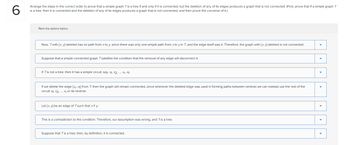
Advanced Engineering Mathematics
10th Edition
ISBN: 9780470458365
Author: Erwin Kreyszig
Publisher: Wiley, John & Sons, Incorporated
expand_more
expand_more
format_list_bulleted
Question
thumb_up100%

Transcribed Image Text:6
Arrange the steps in the correct order to prove that a simple graph T is a tree if and only if it is connected, but the deletion of any of its edges produces a graph that is not connected. (First, prove that if a simple graph T
is a tree, then it is connected and the deletion of any of its edges produces a graph that is not connected, and then prove the converse of it.)
Rank the options below.
Now, Twith {x,y) deleted has no path from x to y, since there was only one simple path from x to y in T, and the edge itself was it. Therefore, the graph with (x, y) deleted is not connected.
Suppose that a simple connected graph 7 satisfies the condition that the removal of any edge will disconnect it.
If T is not a tree, then it has a simple circuit, say, X₁, X2, ..., X₁, X1.
If we delete the edge [xr, x₁) from T, then the graph will remain connected, since wherever the deleted edge was used in forming paths between vertices we can instead use the rest of the
circuit x₁, x2, ..., Xr or its reverse.
Let {x, y) be an edge of Tsuch that x #y.
This is a contradiction to the condition. Therefore, our assumption was wrong, and T is a tree.
Suppose that T is a tree; then, by definition, it is connected.
Expert Solution
This question has been solved!
Explore an expertly crafted, step-by-step solution for a thorough understanding of key concepts.
This is a popular solution
Trending nowThis is a popular solution!
Step by stepSolved in 4 steps with 1 images

Knowledge Booster
Similar questions
- Which of the following graphs contain a subdivision of K3,3 as a subgrapharrow_forwardShow all possible connected sub graphs of the following graph. How many of them are there refer to image belowarrow_forwardLet G be the graph below. The edges are labeled by integers. a 1 10 b 8 = /20 19 2 J C 12 13 If 18 g 17 3 7 d 14 15 h 16 k 4 6 e UT l 1. List the edges of the spanning tree of G obtained by the breadth-first search with the vertex ordering a, b, c, . . . , l. (The answer should be a list of integers (edge labels). The order in the list does not matter.) 2. List the edges of the spanning tree of G obtained by the depth-first search with the vertex ordering a, b, c, ..., l.arrow_forward
arrow_back_ios
arrow_forward_ios
Recommended textbooks for you
 Advanced Engineering MathematicsAdvanced MathISBN:9780470458365Author:Erwin KreyszigPublisher:Wiley, John & Sons, Incorporated
Advanced Engineering MathematicsAdvanced MathISBN:9780470458365Author:Erwin KreyszigPublisher:Wiley, John & Sons, Incorporated Numerical Methods for EngineersAdvanced MathISBN:9780073397924Author:Steven C. Chapra Dr., Raymond P. CanalePublisher:McGraw-Hill Education
Numerical Methods for EngineersAdvanced MathISBN:9780073397924Author:Steven C. Chapra Dr., Raymond P. CanalePublisher:McGraw-Hill Education Introductory Mathematics for Engineering Applicat...Advanced MathISBN:9781118141809Author:Nathan KlingbeilPublisher:WILEY
Introductory Mathematics for Engineering Applicat...Advanced MathISBN:9781118141809Author:Nathan KlingbeilPublisher:WILEY Mathematics For Machine TechnologyAdvanced MathISBN:9781337798310Author:Peterson, John.Publisher:Cengage Learning,
Mathematics For Machine TechnologyAdvanced MathISBN:9781337798310Author:Peterson, John.Publisher:Cengage Learning,


Advanced Engineering Mathematics
Advanced Math
ISBN:9780470458365
Author:Erwin Kreyszig
Publisher:Wiley, John & Sons, Incorporated

Numerical Methods for Engineers
Advanced Math
ISBN:9780073397924
Author:Steven C. Chapra Dr., Raymond P. Canale
Publisher:McGraw-Hill Education

Introductory Mathematics for Engineering Applicat...
Advanced Math
ISBN:9781118141809
Author:Nathan Klingbeil
Publisher:WILEY

Mathematics For Machine Technology
Advanced Math
ISBN:9781337798310
Author:Peterson, John.
Publisher:Cengage Learning,

